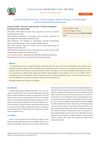 August 2023 in “Sabuncuoglu Serefeddin Health Sciences”
August 2023 in “Sabuncuoglu Serefeddin Health Sciences” CT60 polymorphism might increase the risk of Alopecia Areata.
[object Object]  August 2023 in “Acta Scientific Paediatrics”
August 2023 in “Acta Scientific Paediatrics” A baby from an Indian family had a rare genetic disorder causing no scalp or body hair due to a specific gene deletion.
 June 2023 in “International Journal of Research in Dermatology”
June 2023 in “International Journal of Research in Dermatology” Certain gene variations are linked to severe acne in Egyptian patients and could guide treatment choices.
May 2023 in “Pharmaceuticals” Three specific mutations in the LIPH gene can cause hair loss by damaging the protein's structure and function.
Finasteride may help reduce COVID-19 infection by altering a key gene.
 April 2023 in “Journal of Investigative Dermatology”
April 2023 in “Journal of Investigative Dermatology” CGRP MAbs treatment for migraines may also improve rosacea symptoms, but more research is needed to confirm its effectiveness and safety.
 April 2023 in “The journal of investigative dermatology/Journal of investigative dermatology”
April 2023 in “The journal of investigative dermatology/Journal of investigative dermatology” Tet2 and Tet3 enzymes are important for controlling hair growth and shape by affecting gene activity and DNA structure in hair follicles.
 February 2023 in “Journal of dermatology”
February 2023 in “Journal of dermatology” The first Japanese case of a genetic hair disorder caused by specific mutations in the LIPH gene was identified.
 January 2023 in “Indian dermatology online journal”
January 2023 in “Indian dermatology online journal” A child with ectodermal dysplasia-syndactyly syndrome has a new mutation in the NECTIN4 gene.
November 2022 in “Frontiers in pediatrics” A girl with skin rashes and low zinc levels improved with zinc supplements and had new gene mutations linked to her condition.
 November 2022 in “Journal of Investigative Dermatology”
November 2022 in “Journal of Investigative Dermatology” Some people with schwannomatosis have a new type of mutation in the LZTR1 gene.
 November 2022 in “Journal of the Endocrine Society”
November 2022 in “Journal of the Endocrine Society” A boy with a new NR5A1 gene mutation has a sex development disorder without affecting his adrenal glands.
 October 2022 in “Journal for Research in Applied Sciences and Biotechnology”
October 2022 in “Journal for Research in Applied Sciences and Biotechnology” Certain changes in the SHBG gene may increase the risk of PCOS in Iraqi women.
 September 2022 in “Canadian journal of animal science”
September 2022 in “Canadian journal of animal science” Certain gene variations are linked to the thickness of cashmere goat hair.
 August 2022 in “Frontiers in genetics”
August 2022 in “Frontiers in genetics” A new genetic change in the DSC3 gene is linked to a rare condition causing hair loss and skin blisters in a child.
 July 2022 in “Research Square (Research Square)”
July 2022 in “Research Square (Research Square)” Lower PPARγ levels and specific gene variations are linked to more severe Frontal Fibrosing Alopecia.
April 2021 in “The journal of investigative dermatology/Journal of investigative dermatology” TET enzymes are important for skin and hair development by controlling gene activity in specific areas.
 November 2020 in “International journal of contemporary pediatrics”
November 2020 in “International journal of contemporary pediatrics” Two siblings had a rare immune disorder caused by a FOXN1 gene mutation.
 July 2020 in “The journal of investigative dermatology/Journal of investigative dermatology”
July 2020 in “The journal of investigative dermatology/Journal of investigative dermatology” The enzymes Tet1, Tet2, and Tet3 are important for the development of hair follicles and determining hair shape by controlling hair keratin genes.

A TNFAIP3 gene mutation can cause unusual and varied symptoms of lupus and Sjogren's syndrome.
Certain KIR genes in Indian SLE patients are linked to disease severity and could be biomarkers.
April 2018 in “Journal of Investigative Dermatology” Screening for the NUDT15 gene variant can prevent severe side effects from thiopurine drugs in East-Asian people.
April 2018 in “Journal of Investigative Dermatology” Id2 gene helps keep hair follicle stem cells inactive.
 January 2017 in “Clinical & medical biochemistry”
January 2017 in “Clinical & medical biochemistry” Certain gene variations in AKT2 are more common in women with PCOS and are linked to higher levels of specific hormones and symptoms.
 September 2016 in “Journal of Dermatological Science”
September 2016 in “Journal of Dermatological Science” A gene mutation worsens skin irritation in mice due to a lack of certain fats.
[object Object] 
A new mutation in the CYP11B1 gene was found in a woman with mild hyperandrogenemia, a rare cause of non-classic congenital adrenal hyperplasia.
 February 2013 in “Journal of the American Academy of Dermatology”
February 2013 in “Journal of the American Academy of Dermatology” Certain gene variations might increase the risk of a hair loss condition in Koreans.
 November 2012 in “The Journal of Urology”
November 2012 in “The Journal of Urology” Certain gene variants may raise the risk of prostate enlargement, but taking NSAIDs could reduce this risk.
Melatonin shortens the hair growth cycle by increasing PDGFA gene expression.
 April 2011 in “Vestnik dermatologii i venerologii”
April 2011 in “Vestnik dermatologii i venerologii” Certain gene variations and irregular X chromosome activity may contribute to hair loss in women who can have children.






















